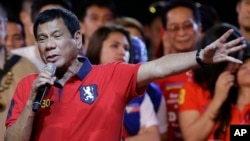Thirty years after emerging from a brutal dictatorship, Filipinos will face a dilemma when they pick a new leader on Monday: Should they choose a sharp-tongued mayor with an audacious promise to wipe out crime and corruption within months, or back reformists who aren't regarded as a threat to democracy?
It's a make-or-break decision with plenty at stake for the Southeast Asian nation, which has turned around under President Benigno Aquino III with one of the highest growth rates in Asia but remains fragile with its massive poverty, inequality and insurgencies.
One of America's closest allies in Asia, the Philippines is in the dead center of long-seething territorial conflicts with China and four other governments that threaten to boil over as the new president takes office on June 30.
"We were called the sick man of Asia before, but are Asia's rising tiger now," Aquino said last week on a trip to campaign for the candidate he's backing, Mar Roxas, a former Cabinet member who has pledged to continue his "straight path" style of reformist presidency.
"We have begun to walk and surely that would be followed with a run. But we couldn't sprint forward if we step back ... if we take a U-turn back to the style of martial law," Aquino said as he criticized presidential front-runner Rodrigo Duterte's threats to close down Congress or establish a revolutionary government should he face impeachment or stonewalling legislators.
In final campaigning Saturday, Aquino warned voters that Duterte could be a dictator in the making and cited the rise of Hitler as an example of how a despotic leader can gain power and hold on to it without public resistance.
Filipinos have been hypersensitive to potential threats to democracy since they rose in a 1986 "people power" revolt that ousted dictator Ferdinand Marcos, who faced allegations of plundering a crushingly poor country and condoning widespread human rights violations by state forces. In 2001, a similar uprising forced Joseph Estrada from the presidency over alleged large-scale corruption.
Aquino's parents, who are revered democracy champions, played a central role in the anti-Marcos resistance movement.
Aquino triumphed in 2010 elections with a landslide victory on a promise to fight corruption and poverty. After introducing new taxes, more accountability and reforms, including in the judiciary, and cracking down on tax evaders, the Philippines posted average GDP rates of 6.2 percent from 2010 to 2015 to become one of the world's fastest-growing economies at a time of global economic slowdown.
The country earned an investment grade from credit rating agencies and economic upswing fostered the rise of a stronger middle class.
Although the government has reported that more than 7 million Filipinos have been lifted from poverty under Aquino, more than a quarter of the country's 100 million people remain poor. Annual debt payments, some of them dating back to the Marcos-era years, and limited funds stymie infrastructure improvement and public services, including law enforcement, fueling frequent complaints.
On the campaign trail, all of the candidates but Duterte promised reforms. Duterte's opponents - Roxas, Sen. Grace Poe, Vice President Jejomar Binay and Sen. Miriam Defensor-Santiago - have all criticized him for remarks that threaten the rule of law and the Philippines' hard-won democracy.
"Duterte is completely out of the system, he's out of the box," said Political Professor Richard Heydarian of De La Salle University in Manila, adding that in the mayor's portrayal of social problems, "there is a gap between the rhetoric and reality but it's working, it's creating panic among a lot of people and rallying them behind Duterte."
Duterte is among the strongman-type leaders who have emerged in recent years in developing countries like the Philippines, with his strong rhetoric resonating amid public insecurities, Heydarian said. "Fear-mongering is the No. 1 strategy of all these strongman candidates. They always say that if not for us, the country will fall apart," he said.
Duterte, a 71-year-old lawyer and former government prosecutor, built a political name with his iron-fist approach to fighting crime in southern Davao city, where he has served as mayor for 22 years. His campaign vow to eradicate crime, especially drug trafficking, as well as corruption in three to six months if he becomes president has won attention and support, but has also sparked alarm and doubts.
"All of you who are into drugs, you sons of bitches, I will really kill you," Duterte told a huge cheering crowd Saturday in his final campaign rally in Manila. "I have no patience, I have no middle ground, either you kill me or I will kill you idiots."
Despite his devil-may-care way with expletives and irreverence and allegations of corruption hurled against him by a senator, Duterte has been leading election polls by more than 10 percentage points over Roxas and Poe. While it may be difficult for rivals to catch up, analysts say the race remains too close to call.
"I am supporting Mayor Duterte to give change a chance," said real estate broker Jose Allan Bacalando, who joined the mayor's Manila rally, adding that fears that he would threaten democracy "is the spiel of his enemies."
While it remains to be seen whether Duterte is serious with his remarks about resorting to authoritarian steps to deal with opponents who would block the radical changes he would pursue in case he becomes president, Aquino and other critics say he causes alarm just by uttering them.
"We may have a self-fulfilling prophecy," Heydarian said. "Perception makes reality in politics, unfortunately, and if the perception is Duterte wants to create a dictatorship, that will create its own dynamics."




